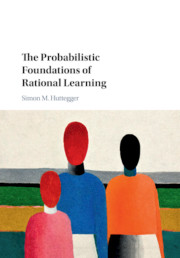Book contents
- Frontmatter
- Dedication
- Contents
- List of Figures
- Preface and Acknowledgments
- Introduction: Abstract Models of Learning
- 1 Consistency and Symmetry
- 2 Bounded Rationality
- 3 Pattern Learning
- 4 Large Worlds
- 5 Radical Probabilism
- 6 Reflection
- 7 Disagreement
- 8 Consensus
- Appendix A Inductive Logic
- Appendix B Partial Exchangeability
- Appendix C Marley's Axioms
- Bibliography
- Index
6 - Reflection
Published online by Cambridge University Press: 25 October 2017
- Frontmatter
- Dedication
- Contents
- List of Figures
- Preface and Acknowledgments
- Introduction: Abstract Models of Learning
- 1 Consistency and Symmetry
- 2 Bounded Rationality
- 3 Pattern Learning
- 4 Large Worlds
- 5 Radical Probabilism
- 6 Reflection
- 7 Disagreement
- 8 Consensus
- Appendix A Inductive Logic
- Appendix B Partial Exchangeability
- Appendix C Marley's Axioms
- Bibliography
- Index
Summary
I have beliefs. I may not be able to describe “the precise reasons” why I hold these beliefs. Even so, the rules implied by coherence provide logical guidance formy expression of these beliefs.My beliefs will change. I may not now be able to describe the precise reasons how or why these changes will occur. Even so, just as withmy beliefs, the rules implied by coherence provide logical guidance for my expression of belief as to how these beliefs will change.
Michael Goldstein The Prevision of a PrevisionIn the preceding chapter, we saw how central reflection and martingale principles are to a generalized theory of learning. The purpose of this chapter is to examine those principles in more detail. Reflection requires one's future beliefs to cohere with one's prior beliefs. There are many examples of cases where this would not seem advisable.What these examples have in common is that factors other than learning new information have an influence on how beliefs change. If we restrict belief revisions to learning events, the reflection principle can be derived as a requirement of rational belief change in three different ways. The first one, based on dynamic Dutch book arguments, is well known. The other two approaches are new. According to one, reflection principles can be derived within an accuracy framework, in which degrees of belief are regarded as best estimates of truth values. The third approach starts with the value of knowledge theorem of decision theory. The value of knowledge theorem says that you never expect to make worse decisions after having conditioned your prior probabilities on some new information: typically, new information is valuable. The same should be true for learning in general, not just for Bayesian conditioning. Reflection principles are an immediate consequence of requiring that the value of knowledge property holds for generalized learning.
Probabilities of Future Probabilities
Recall the black box learning situation introduced in the previous chapter. You are about to change your degree of belief for some proposition A in response to an unspecified learning experience.
- Type
- Chapter
- Information
- The Probabilistic Foundations of Rational Learning , pp. 126 - 148Publisher: Cambridge University PressPrint publication year: 2017



